Hey everyone. Barbarella here and so far surviving my self-imposed house arrest. Even though I’ve been at home, I’ve been crazy-busy. I spoke via telephone last week with Benjamin Kasulke, the director of upcoming teenage friendship flick, BANANA SPLIT. Written by Hannah Marks and Joey Power, the film follows two teenage girls who form a friendship. The only problem is one of them is dating the other’s ex.
BANANA SPLIT will be available on On Demand and Digital beginning March 27 through Vertical Entertainment. Benjamin and I discussed the film and his move from cinematography to directing.
Which BANANA SPLIT character were you most like as a teenager and in what ways were you alike?
“I was oddly the closest to Ben, Luke Spencer Roberts’ character. I was perpetual friend-zone, third wheel. I don’t think I have the sort of moral compass Ben has in that movie. I think I was too dumb for that. I was definitely watching from the bench when everybody else was dating each other.”
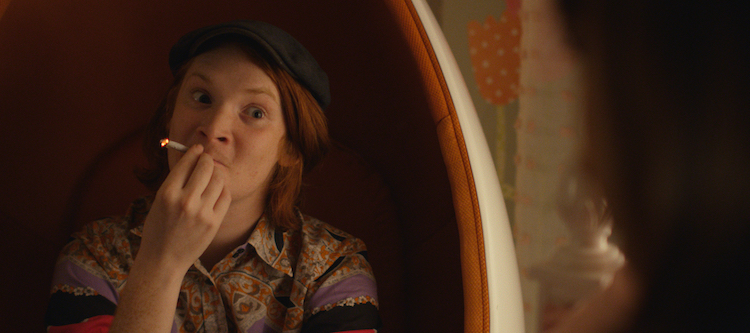
When you’re on set, sometimes things have to be adjusted. What kinds of changes did you make to the script, and what were the biggest reasons for those changes?
“On the page, it was really like a movie that sort of followed both characters, Hannah Mark’s character and then separately, Liana Liberato’s character. The first third of the movie really brought both of their characters out and sort of made it clear to the audience that they needed to be friends by the point that they meet. We shot all that stuff, but it started to feel more and more like it was April’s movie. It was easier, I think, to track. It was easier to portray as a 90-minute coming of age story [about] April rather than as an April and Clara experience.
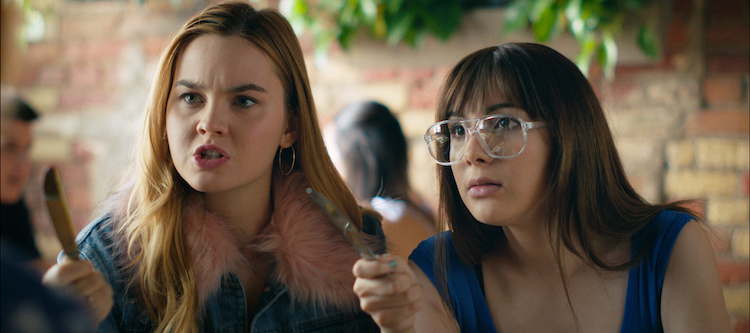
“We had some other things that were really like…we were just calibrating the tone. There were a lot of jokes that were shot and didn’t make it into the final edit because they felt a little too mean at points. They felt right as like a millennial, hashtag-ironic type of humor, but they were too much for the audience to really sort of root for any of the characters. April was really mean in an early cut of the movie. All of us watched it, and it was funny because we were there, but she was too mean for anyone to empathize with. And that’s the last thing we wanted. You know, we really wanted a film that felt universal and thematically kind of applicable to anybody’s life that’s ever been a kid or ever had their heart broken or kind of grew up and had a real friendship.”
Would you talk about the casting process for Agnes?
“Agnes is the best. Addison Rickey plays Agnes. She was the only taping we did for that. We looked at a lot of people and talked about a lot of people, and we got Addison’s tape and we were like, “Oh, it’s her.” She’s amazing. She’s just so snarky and funny and kind of mean in a great way. I was looking at Addison’s credits and she was a child actor who does a lot of Nickelodeon stuff. I knew that she was a young kid, and I knew that she was working constantly, which is a good sign. We had this tape, and she was like a little missile. The meanness is so great. She’s funny and mean on the page in the screenplay, but Addison sort of found her way into it and took it to a whole other level.
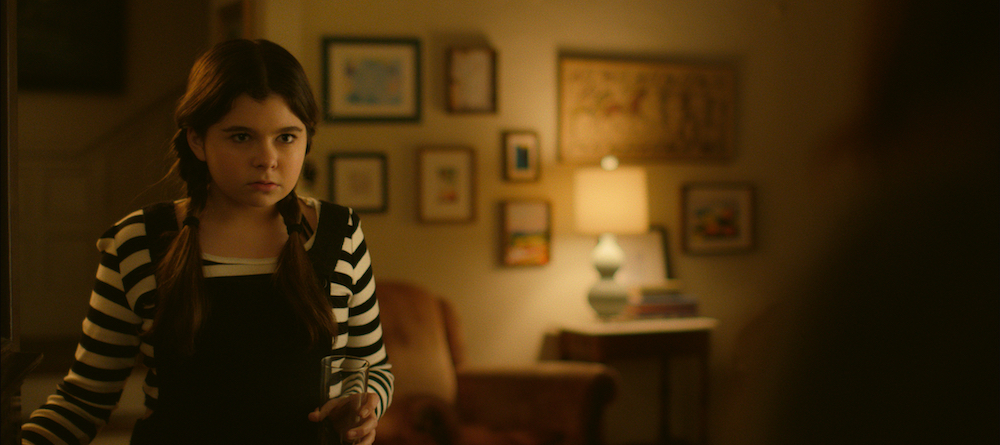 “We had her read the first time you meet her where April’s depressed and not eating her salmon. In that scene, [it was scripted something like], “I’m going to live with Nick and we’re gonna have our whole house and kids.” In one of the takes, I [tell Addison], “Let’s have you just talk about the life you’re going to make with Nick. Tell us what you guys are going to do together.” So, when you watch the film, her whole list of what her life is going to be like with Nick, and the pets they’re going to have, where they’re going to live, that’s all her. She’s a really good improviser, and she just gets it. One of the first days on set, she was just like “This is so fun. I never get to do this.” She [usually] just gets to show up and hit a mark and drop a fun and family-friendly kind of starchy joke on a Nickelodeon show. This was a totally different thing for her. I was really excited that she was into it. She did have to say a lot of dirty stuff, and I remember calling her parents and [saying], “I don’t know you people at all, and I need somebody nearby in case she has questions ‘cause she’s saying a lot of horrible stuff in this movie.“ Her parents were really cool about it. They were the coolest stage parents you could possibly ask for. The costume designer found this great Jackie-Onassis-meets-Wednesday-Addams look for her. It really works well. I love it. She’s my favorite.”
“We had her read the first time you meet her where April’s depressed and not eating her salmon. In that scene, [it was scripted something like], “I’m going to live with Nick and we’re gonna have our whole house and kids.” In one of the takes, I [tell Addison], “Let’s have you just talk about the life you’re going to make with Nick. Tell us what you guys are going to do together.” So, when you watch the film, her whole list of what her life is going to be like with Nick, and the pets they’re going to have, where they’re going to live, that’s all her. She’s a really good improviser, and she just gets it. One of the first days on set, she was just like “This is so fun. I never get to do this.” She [usually] just gets to show up and hit a mark and drop a fun and family-friendly kind of starchy joke on a Nickelodeon show. This was a totally different thing for her. I was really excited that she was into it. She did have to say a lot of dirty stuff, and I remember calling her parents and [saying], “I don’t know you people at all, and I need somebody nearby in case she has questions ‘cause she’s saying a lot of horrible stuff in this movie.“ Her parents were really cool about it. They were the coolest stage parents you could possibly ask for. The costume designer found this great Jackie-Onassis-meets-Wednesday-Addams look for her. It really works well. I love it. She’s my favorite.”
What are the essential things to keep in mind and address when directing an acid trip?
“I wasn’t a big acid guy. Somebody dosed me once, and that was plenty. I wasn’t asking for it, and it was a long time ago. I think for me, the biggest thing is that if you film an acid trip as an experience between two people, you’re watching it from the outside. When somebody’s on acid, everything’s internalized. If you took a picture of somebody on acid, like a still photo, it just looks like a person standing there, and maybe their eyes are a little bit big. If you do that on film, you’re waiting in real time for someone to show you they’re on acid, and it isn’t going to look like anything. Most films don’t take place entirely from the perspective of somebody on acid. All of a sudden you have to break [from reality to trip]. In doing that, you have to sort of be restrained and pick your battles. You just want to build it out with the sound design, [for example]. You can’t go too crazy for a minute in the middle of a 90-minute movie; you might lose some people.
“These girls drop acid. They have the most fun, crazy time that just the two of them share and then the next morning, they’re still sort of awake and coming down off of it, and they’re sharing emotional and sort of vulnerable moments. Hannah always says the hope is that you’re watching these scenes back to back, and you’re seeing this relationship that is totally hilarious and on the upswing and fun, and also totally goes deep and is super sweet and kind of sad.”
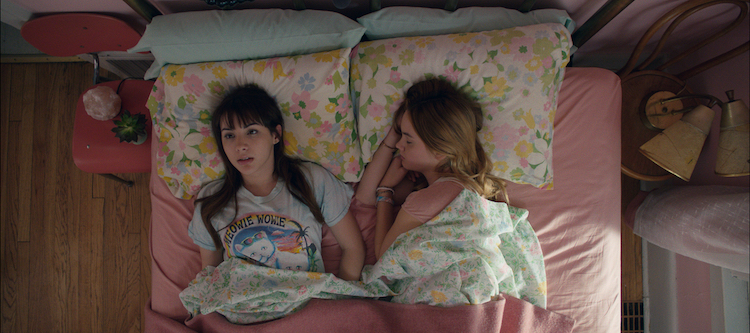
You and Hannah met at the Sundance Lab. Would you explain that experience and how the two of you developed a relationship through it?
“Everybody knows the film festival, but Sundance Institute has a series of labs. It’s like a workshop for feature filmmakers. They do a bunch a different work, but I worked as a cinematographer for the feature film labs [where] Sundance pulls in eight filmmakers that are making their first or second feature. They give them a place to work and a crew, hire a bunch of actors, and [provide] a lot of mentorship to try to shoot a workshop version of the hardest parts of their movie. The idea from Sundance is you work on the hardest parts of your movie here, you’ll perfect them. They won’t go in your final movie, and they won’t affect your career. You can experiment. You can fail, and it’s all okay. Hannah and I met in that environment at one of these labs with Marielle Heller when she was workshopping DIARY OF A TEENAGE GIRL. In the workshops at Sundance Labs, I was cinematographer for Marielle Heller and Hannah Marks was there helping her workshop scenes as the lead. All of us became really close and worked really, really hard for a couple of weeks. Hannah and I stayed in touch. She started making shorts over the years, and she was always watching what I was shooting. I would send her shorts and stuff that I was working on. It was fairly organic. I think both of us had similar sensibilities, and we both have really similar tastes in films and what makes us excited as storytellers.”
This is your first experience directing a feature film. Did you get involved because Hannah sent you the script and you wanted to direct, or did she ask you to do this?
“Over the years we’ve sent each other stuff for notes or just like, “Hey what do you think of this? I might work on it.” I thought she just wanted notes. I didn’t have a lot of notes for her. The script is really good. I said, “This is hilarious. I can’t wait to see it.” Then she said, “Well, I’m looking for a director because I’m finishing a film right now as a director, and I can’t do it. I need to get this movie made because I want to be in it.” She felt that she could only play high-school age for so much longer before it wasn’t believable. It was sort of like someone lit the wick on the dynamite and was like you gotta make this thing before this blows.
“Once she asked me, it was like, “Oh, this is what you wanted. I thought you just wanted me to read this thing.” I got really, really excited. Of course, it’s really, really strong, it’s very close - humor-wise and dramatically - it’s very close to what’s on the screen. Who wouldn’t want to direct a really well-written script if somebody just dumped it in your lap?”
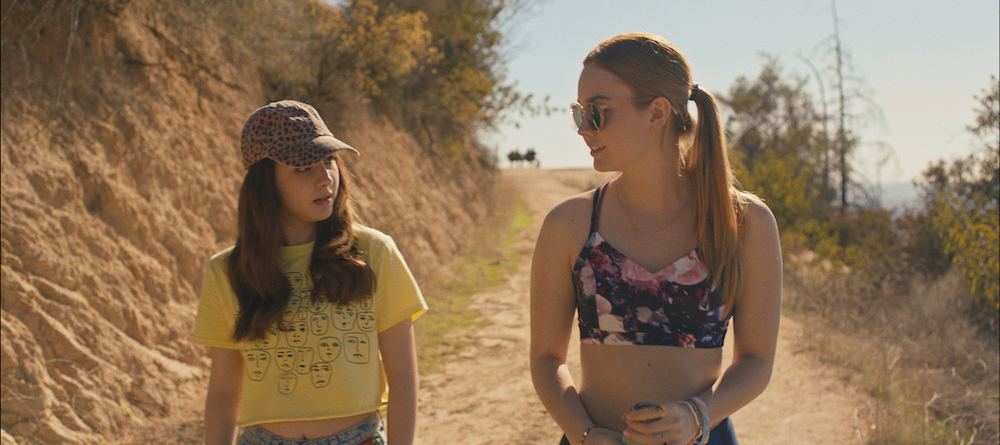
Jumping from cinematographer to director, what were the biggest differences you noticed?
“[As a cinematographer] there was a time in my life where I could shoot ten to thirteen movies in a year when I was doing tiny indies. I would just shoot movie after movie after movie after movie. In directing BANANA SPLIT, it was almost all I did for two years. The investment of your time is just so much more. It’s kind of like…I shoot all sorts of movies you know. Luckily these days I’m really picky about what I shoot, but there were years where I just shot everything because it was part of an education, and there were a lot of people I really loved to work with and were making all kinds of films. I wasn’t getting paid a lot so I had to work a lot to pay the bills, and truthfully small indie films when I was first starting out were shot over three weeks total. It was easy to shoot everything. Why not? You were just learning. [As a director] two years of your life is a really long time, time away from your partner, time away from your home, so I’m a lot more picky about what I would want to direct, at least as far as features go.
“As far as conceiving things, it’s fairly similar. The title of director has a lot more heaviness to it as far as like, you always have to think, “Why am I making what I’m making? Why does the world need this particular version of this story?” As an artist, you’re bringing your own perspective to the way this thing is told. Is that valid? Is that worth it? Does the world need that right now? Those kind of thoughts are much louder as a director. I have them as a cinematographer, as it kind of plays into the way you shoot things, the way you deal with people, the way you tell stories. It’s much less stronger than when your name’s on the director title card.”
What is the most important thing you’ve learned during your career so far?
“I think the biggest thing for me is it’s about collaboration. You can’t exist in a bubble. You can’t just make things on your own. You kinda can’t live in the world these days fully solo and on your own. You have to find the way that you collaborate with people. You find the way that you work with a group of people to make something that’s bigger than the sum of its parts, meaning that it’s bigger than all of the skill sets that people bring in individually. It’s bigger than the actors, it’s bigger than the story itself, and you really need to strive towards something that transcends all of those small pieces into something that’s going to last and be good for the world. You know, I’m not a doctor. I’m not a novelist. This is what I can do. If I’m going to put this out there, that would be great. And I need people around me to feel like what we’re putting out there is great and feel like they’re valued and they’re an important piece of that.”
I had an enjoyable time chatting with Benjamin Kasulke, and I enjoyed BANANA SPLIT. A sweet and funny film about teenage love and friendship, it will be available this weekend on Apple TV and will be rolling out to some other digital platforms eventually.
